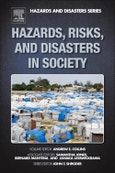Hazards, Risks, and Disasters in Society provides analyses of environmentally related catastrophes within society in historical, political and economic contexts. Personal and corporate culture mediates how people may become more vulnerable or resilient to hazard exposure. Societies that strengthen themselves, or are strengthened, mitigate decline and resultant further exposure to what are largely human induced risks of environmental, social and economic degradation. This book outlines why it is important to explore in more depth the relationships between environmental hazards, risk and disasters in society. It presents challenges presented by mainstream and non-mainstream approaches to the human side of disaster studies.
By hazard categories this book includes critical processes and outcomes that significantly disrupt human wellbeing over brief or long time-frames. Whilst hazards, risks and disasters impact society, individuals, groups, institutions and organisations offset the effects by becoming strong, healthy, resilient, caring and creative. Innovations can arise from social organisation in times of crisis. This volume includes much of use to practitioners and policy makers needing to address both prevention and response activities. Notably, as people better engage prevalent hazards and risks they exercise a process that has become known as disaster risk reduction (DRR). In a context of climatic risks this is also indicative of climate change adaptation (CCA). Ultimately it represents the quest for development of sustainable environmental and societal futures. Throughout the book cases studies are derived from the world of hazards risks and disasters in society.
Table of Contents
1. Introduction: hazards, risks and disasters in society
Section 1: Perspectives on people centred prevention and response to natural hazards 2. Against the drive for institutionalization: two decades of disaster volunteers in Japan 3. Disastrous disasters: a polemic on capitalism, climate change and humanitarianism 4. Disaster risk governance: evolution and influences 5. Developing sustainable capacity for disaster risk reduction in Southern Africa in disasters: a case for affirming human dignity 6. Reactive to pro-active to reflective disaster responses: introducing critical reflective practices in Disaster Risk Reduction (DRR)
Section 2: Hazards in social, technological and political-economic change 7. Vulnerability, coping and loss and damage from climate events 8. Flood shelters in Bangladesh: some issues from the users' perspective 9. Natural disasters and violent conflicts 10. Everyday practices and symbolic forms of resistance: adapting to environmental change in coastal Louisiana 11. Political responses to emergencies 12. Double disaster: disaster through a gender lens
Section 3: Cross-disciplinary and non-mainstream futures of dealing with hazards, risks and disasters in society 13. Disaster risk reduction in the shadow of the law 14. Self-care in Bangladesh: local level resilience and risk reduction 15. Culture: the crucial factor in hazard, risk and disaster recovery the anthropological perspective 16. Risk, resilience and readiness: developing an all-hazards perspective 17. Interpretative frameworks of disaster in society close up 18. Therapeutic communities in the context of disaster 19. View of Abrahamic religions on natural disaster risk reduction 20. Conclusion: hazards, risks and disasters in society








